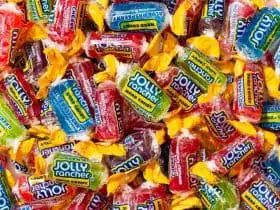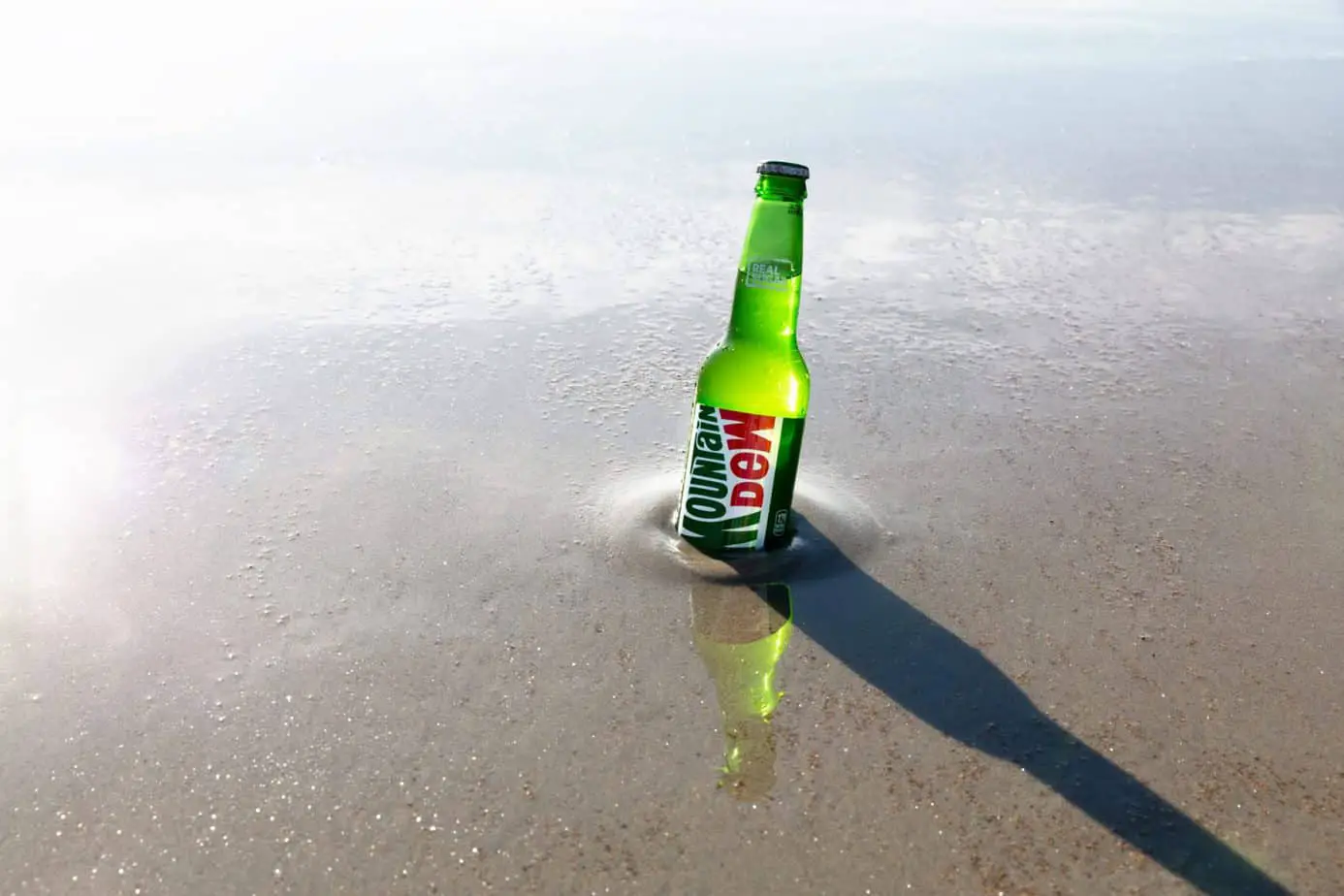Vegans assemble! Your favourite American soda might just be vegan. There is no match when it comes to Mountain Dew. No other bottled drink looks so peculiar while tasting so extraordinary. Mountain Dew never ceases to amaze us with their best unleashed taste in every flavour they put us across. But is Mountain Dew vegan?
This thought would have crossed your mind more times than necessary. If you are still wondering, let’s answer this as grandly as the drink we are talking about. YES! All flavours of Mountain Dew are vegan according to most standards.
Like all considerably vegan foods, there are some contested ingredients in Mountain Dew you should be aware of. Many prudent vegans choose to not include any aerated drinks in their diet owing to the presence of these potentially non-vegan ingredients.
Mountain Dew contains some potential non-vegan ingredients you should be aware of
As far as we have researched, there are no obvious animal based ingredients in Mountain Dew. This is quite unlike the use of fish oil and gelatin in Tropicana’s Heart Healthy Orange juice or the use of animal sourced coloring agents in Minute Maid’s Grapefruit juice. The controversial ingredients in Mountain Dew include glycerol ester, processed cane sugar, artificial colors, natural and artificial flavours, and taurine. It is sometimes speculated that certain flavours of Mountain Dew contain honey and lanolin too as ingredients.

Mountain Dew lists glycerol ester of wood rosin as an ingredient
Many soda companies are known to employ this ingredient for imparting better coloration to their drinks. Glycerol ester of wood rosin is widely speculated to be derived from animal based sources. This is because that’s just how glycerols are usually obtained.
Animal fats are the simplest and the most economical means of obtaining glycerol for capitalist manufacturers.
While this may not be certainly true for Mountain Dew, we may never know the actual truth. Some strict vegans choose to adhere to a natural diet in order to avoid such scrupulous ingredients.
We’d recommend you to remain more strict in the avoidance of obvious non-vegan ingredients like meat, poultry, and dairy products. Their reduction or absence from your diet will save more animal lives and have more direct impact.
We never know where the cane sugar is coming from
You would have often witnessed prudent vegans avoiding a large variety of processed foods altogether because of the presence of processed sugar. While sugar itself may not ever contain any animal based products, it is true that a large portion of sugar in America is filtered using bone char.
Of course unfiltered brown sugar is available in the market as organic and vegan sugar but that is not the type which usually enters factory made foods and drinks. Bone char is a substance made by high-heat combustion of cattle skulls and other bones in order to attain a highly absorbent carbon product which can be utilized in apparent cleaning of sugar.
Bone char does not enter the final refined sugar as a constituent but its use renders the production process of cane sugar laden with animal cruelty and makes such sugar non-vegan according to ethical standards.
The confusion is, we don’t know whether Mountain Dew or any other drink for that matter actually contains sugar filtered by this process. It is possible for cane sugar to be bleached and filtered using granular activated carbon which has recently replaced bone char in many factories. It is also possible for sugar to not be produced from cane at all. Many industries prefer to derive their sugar from beetroot and coconut instead.
You will never know for sure where your sugar comes from so it is really no good fussing about it. It is safe to assume all sugar as vegan and focus on limiting other known non-vegan ingredients.
The vibrant colors you love have a dark side
Most Mountain Dew flavours contain one artificial color or the other. It is in fact known that a majority of people love Mountain Dew just for the sake of their excellent colors.
Artificial colors are rather safe due to the fact that they are synthetically produced in laboratories with no derivations from animal sources. Well, unless the color is Red 4 derived from crushed beetles. We have listed the artificial colors used in various flavours of Mountain Dew. Now you can rise above assumptions and know exactly what you are drinking.
A popularly known artificial coloring agent called Yellow 5 is an ingredient in the Original, Diet, Code Red, Live-Wire, and AMP GM Tropical Strike Mountain Dew flavours.
Yellow 5 is obtained from petroleum and is in no way related to animal based sources for its production. Likewise, Red 40 is also obtained from petroleum and not from animal products.
Red 40 is utilized as a colorant in Merry Mash-up, Voltage, Live-Wire, Pitch Black, and AMP GM Cherry Burst Mountain Dew flavours.
Another artificial colorant found in Mountain Dew is Blue 1. Vegan on the basis of origin, this colorant is a constituent of Code Red, Voltage, Pitch Black, AMP Original, and AMP GM Cherry Burst Mountain Dew flavours.
But this is not all when it comes to artificial colors. All these coloring agents are notorious for the ethical nuisance they have created for so called lab animals.
Yellow 5, Red 40, and Blue 1 may not be produced from animals but they are definitely tested on animals in order to prove their safety of usage in humans.
Mice, rabbits, monkeys, and dogs are tested with toxic doses of these products in order to ascertain their adequate safety values for incorporation in human foods. The animals in turn die from the exposure or are killed in case they survive with the adverse effects.
Apart from rampant animal cruelty, artificial coloring agents are also classified for being harmful to human health. They have been identified by scientists for being linked to cancer and ADHD in children. Many countries have banned the use of such colorants in order to put a halt on animal testing and to contain the adverse effects of such substances.
The natural and artificial flavours could have come from wherever
Natural flavours could be obtained from both animal and plant based sources. The interesting thing is, the manufacturers often don’t specify which is which.
The flavours used in Mountain Dew could come from any source we may not have expected. Because of this reason, some prudent vegans choose to avoid products with natural flavours altogether unless their source is clearly specified.
If this bothers you, you could approach the manufacturers of Mountain Dew with a query regarding particular ingredients. We hope your query is adequately answered. Either way, we don’t recommend you to forego Mountain Dew only for the sake of doubts. Always look for concrete reasons and study the exact amount of impact your avoidance of a product would make.
The uncertain presence of Vitamin D3 may bother you
The presence of Vitamin D3 bothers many vegans for obvious reasons. One popular method of obtaining Vitamin D3 is through a substance called lanolin present in sheep’s wool.
It is not known whether the wool is gathered from dead sheep or that live sheep are skinned in order to obtain large tons or profit. Vegans do not favour the use of wool as it is an animal based product. And lanolin, derived from sheep wool, is obviously non-vegan.
It is not known whether lanolin is a constituent of Mountain Dew or not. It may or may not be.
Honey is another ingredient we aren’t sure about
Vegans do not allow honey in their diet because it is a product obtained from bees and bees are animals. Moreover, these hard working animals don’t produce honey for us. Their large hive depends on this sweetener for nutrition and our stealth is mere animal exploitation.
Many bees are killed in the process of obtaining honey. It is a matter of worldwide concern that these poor essential insects are already endangered because of human interference with their natural life. Some vegans still don’t consider honey a non-vegan product. It is truly entirely your personal choice.
Some flavours of Mountain Dew have been reported to contain honey. Although, this hasn’t been proven and you may not worry about it yet.
Is Mountain Dew vegan or dew is just a fancy name?
Mountain Dew is considerably vegan when it comes to aerated drinks. It is not known to contain any direct animal based ingredients. There are controversial non-vegan ingredients for sure, but their consumption is a very much debated topic as of now.
Prudent vegans may choose to not include any controversial substance in their diet. But the truth remains that this practice may not be as impactful as the effort required in its attainment.
Vegans should avoid eating all foods that contain animal meat or poultry products. And vegans should refrain from dairy. These three major food items are the real culprits of animal suffering.
Your bottle of Mountain Dew is comparatively vegan. Chug it down! You are saving numerous animals every day!












Luv Mountain Dew!! I drink the frozen Baja blast from Taco Bell a lot lol